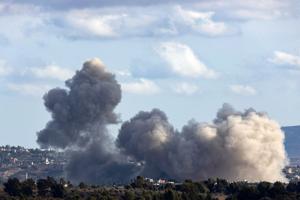
Can Israel justify booby-trapping the pagers and walkie-talkies of thousands of Hezbollah militants, imperilling innocent Lebanese bystanders? Merely asking for an answer invites another question: How does Hezbollah, a Lebanese militia created by Iran, justify across Israel last month, placing millions of civilians in the line of fire? These two rivals and their supporters keep going back in time to rationalize their tit-for-tat retaliations. But the cataloguing of human casualties this week is ultimately pointless if it serves only as a pretext or justification for more lives lost in the next lethal battle. For all the righteous claims and counterclaims of revenge, the war pitting Israel against Lebanon’s Hezbollah militia has little to do with who was killed last month and the month before last.
In this war without end, the origins — and solutions — are too easily obscured. A better question, rarely asked: Why is Hezbollah in this fight at this time, and who exactly is it fighting for? Hezbollah is many things — a Shia Muslim militia fighting force armed and trained by Shia-majority Iran, banned as a terrorist group by Canada, but also a social and political movement with elected legislators. It has unrivalled power in Lebanon — the only sectarian militia that refused to disarm after the 1975-90 civil (and religious) war — yet it is not the legal representative of Lebanon which is, lest we forget, a sovereign state.

It is waging war against Israel while exposing all Lebanese citizens to the inevitable consequences — be it the small explosive charges hidden in Hezbollah pagers or the massive explosive charges that may soon rain down on both countries. Ostensibly, it is fighting in solidarity with Hamas in the aftermath of its Oct. 7 massacre of more than 1,200 Israelis and the capture of more than 200 hostages.
Solidarity? There are many nations across the Middle East and the world whose rulers are no less angry at Israel’s counterattack and overkill of Palestinians in Gaza, but who among them has taken it upon themselves to wage war against the Jewish state? Not Egypt nor Jordan, not even Turkey. Only the Iranian-backed Houthi militia, which controls part of war-ravaged Yemen, sees fit to join the fight at Iran’s behest. By what logic, then, does Hezbollah presume to engage and endanger Lebanon in a war that its army and parliament are not fighting, a conflict that Lebanese voters never bought into but must forever pay the price for? The answer, to state the obvious, is that Iran is calling the shots, not Lebanon nor Yemen.
Israel wants a quiet border in the north, just as it demanded a quiet border in the south. Those who fault only Israel for the current conflict, or point to “occupation” as the cause, have forgotten that Israel withdrew from Gaza in 2005 and Lebanon in 2000. Yes, Gaza came to resemble an open air prison, but it was not, in fact blockaded — Israel restricted only materials that could be repurposed for war after Hamas returned to terrorism instead of partnering for peace (as the Palestinian Authority did in the West Bank).
Hamas’s massive tunnel network suggests Israelis had good reason, in retrospect, to restrict imports that would later be turned against them. Israel’s legacy in Lebanon is no less complicated. It went to war in the 1980s, foolishly, to pacify the terrorist attacks from Yasser Arafat’s PLO bases in Lebanon (before they made peace) — and it occupied a border security strip in the 1990s to constrain Hezbollah.
But the reality is that Israel left Lebanon nearly a quarter-century ago. What, then, are the goals of Hezbollah’s “resistance,” now that there are no Israelis left on Lebanese soil? The strategy of longtime leader Sheikh Hassan Nasrallah is not so much resisting but provoking and poking Israel, at Iran’s behest, in hopes of whipping up Lebanon’s Shia Muslims into even stronger support. Nasrallah’s double-barrelled approach relies on destabilization and delay as his weapons of choice.
By mounting low-level attacks on northern Israel, Hezbollah forced as many as 80,000 citizens from the border region shortly after Oct. 7. First displace Israelis, then keep the area depopulated.
Now, after a year of waiting and watching, Israel’s political leadership has concluded the status quo is no longer sustainable. The military is mobilizing in the north. Israeli Prime Minister Benjamin Netanyahu’s motives are politically self-serving to be sure.
But in no democracy could any elected leaders face their voters and concede that so massive a population displacement, in a border region, could continue indefinitely. Yes, Israel sent a deadly message this week through the exploding pagers: Time has run out. Nasrallah’s response, in a speech Thursday is more of the same: Time is on Hezbollah’s side.
His wounded fighters will regroup, restore their communications network and return to the attack. Meantime, Nasrallah boasts he will keep Israelis in suspense until a time of his own choosing, just as he has for the past year. But when your opponent calls your bluff, suspense is no longer a sustainable strategy.
Just as Hamas exposed Gazans to a war they could not win, so too Hezbollah is leading the Lebanese into a war they cannot control..














